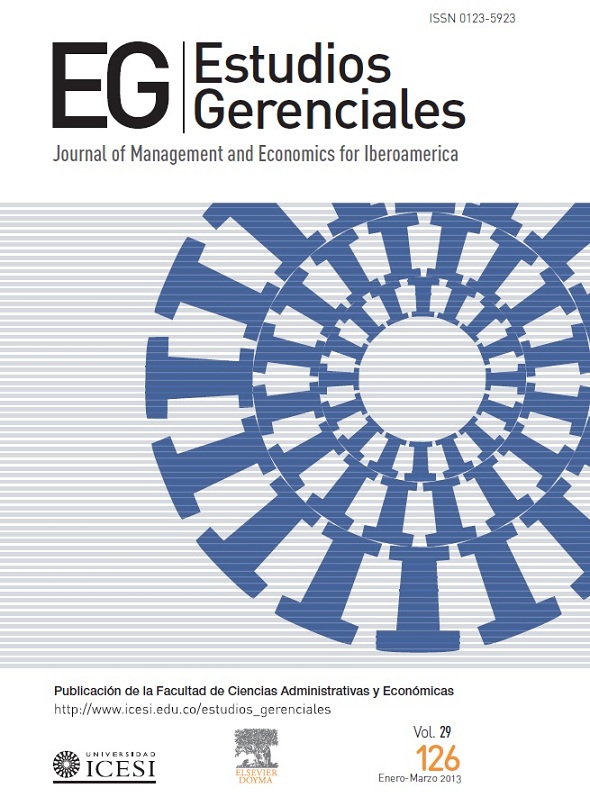¿Es posible una gestión dinámica de la cooperación en dilemas sociales de gran escala?: el caso de la crisis de electricidad de Colombia de 1992
DOI:
https://doi.org/10.1016/S0123-5923(13)70024-XKeywords:
Gestión de la cooperación, Dilemas sociales, Mecanismos, Dependencia condiciones inicialesAbstract
Este artículo presenta cómo una gestión dinámica de la cooperación puede enfrentar la dependencia a las condiciones iniciales que caracterizan al mecanismo de cooperación basado en la confianza, lo que permitiría promover y sostener la cooperación con la que los grupos pueden superar los dilemas sociales. Para esto, se elaboró un constructo siguiendo los lineamientos metodológicos de la Dinámica de Sistemas que da cuenta de la gestión de la cooperación aplicada durante la crisis de electricidad de Colombia de 1992. A partir de los resultados, se concluye que la gestión de la cooperación basada en mecanismos dinámicos es posible en dilemas de gran escala y puede ser utilizada para hacer efectiva y sostenible la cooperación basada en la confianza en dichas situaciones.
Downloads
References
Axelrod, R. & Hamilton, W. (1981). The evolution of cooperation. Science, 211(4489), 1390-1396.
Biel, A., Von Borgstede, C. & Dahlstrand, U. (1999). Norm perception and cooperation in large scale social dilemmas. En M. Foddy (Ed.), Resolving social dilemmas: Dynamic, structural, and intergroup aspects. Filadelfia: Psychology press.
Chen, C., Chen, X. & Meindl, J. (1998). How can cooperation be fostered? The cultural effects of individualism-collectivism. Academy of Management Review, 23(2), 285-304.
Corte Constitucional Sentencia N.° C-447/92 (1992). Sentencia N.°. c-447/92. Sentencia de constitucionalidad decreto 680 de 1992.
Doz, Y. (1996). The evolution of cooperation in strategic alliances: initial conditions or learning processes? Strategic Management Journal, 17(51), 55-83.
Foddy, M. (1999). Resolving social dilemmas: dynamics, structural, and intergroup aspects. Filadelfia: Psychology press.
Forrester, J. (1961). Industrial Dynamics. Cambridge: MIT press.
Fryxell, G., Dooley, R., & Vryza, M. (2002). After the ink dries: The interaction of trus and control in us based international joint ventures. Journal of Management Studies, 39(6), 865-886.
Goldman, C., Barbose, G. & Eto, J. (2002). California customer load reductions during the electricity crisis: Did they help to keep the lights on? Journal of Industry, Competition and Trade, 2(1), 113-142.
Hagen, J. & Choe, S. (1998). Trust in japanese interfirm relations: institutional sanctions matter. Academy of Management Review, 23(3), 589-600.
Hardin, G. (1968). The tragedy of the commons. The population problem has no technical solution; it requires a fundamental extension in morality. Science, 162(859), 1243-1248.
Jones, G. & George, J. (1998). The experience and evolution of trust: Implications for cooperation and teamwork. Academy of Management Review, 23(3), 531-546.
Kollock, P. (1998). Social dilemmas: The anatomy of cooperation. Annual Review of Sociology, 24(1), 183-214.
Markóczy, L. (2003). Trust but verify: Distinguishing distrust from vigilance. En Academy of Management Conference. Seattle.
Markóczy, L. (2007). Utilitarians arent always fair y the fair arent always utilitarian: Distinct motives for cooperation. Journal of Applied Social Psychology, 37(9), 1931-1955.
McGinnis, M. & Ostrom, E. (2008). Will Lessons from Small-Scale Social Dilemmas Scale Up? En A. Biel. (Ed.). New issues and paradigms in research on social dilemmas, Nueva York: Springer US.
McKnight, D., Cummings, L. & Chervany, N. (1998). Initial trust formation in new organizational relationships. Academy of Management Review, 23(3), 473-490. Ostrom, E. (1990). Governing the commons: The evolution of institutions for collective action. Cambridge: Cambridge University Press.
Ostrom, E. (2000). A behavioral approach to the rational choice theory of collective action. En M. McGinnis. Polycentric games and institutions: readings from the Workshop in Political Theory and Policy Analysis. Michigan: University of Michigan Press.
Ostrom, E. & Walker, J. (2005). Trust and reciprocity: Interdisciplinary lessons from experimental research. Nueva York: Russell Sage Foundation Publications.
Parkhe, A. (1993). Strategic alliance structuring: A game theoretic and transaction cost examination of interfirm cooperation. Academy of Management Journal, 36(4), 794-829.
Parra, J. (2011). Constructo para la Evaluación de la Cooperación en Dilemas Sociales de Gran Escala. Tesis de Doctorado en Ingeniería Área Sistemas. Universidad Nacional de Colombia.
Presidencia de la República de Colombia (1992). Informe del Gobierno a la Corte Constitucional sobre las causas del racionamiento.
Smith, V. (1991). Rational choi The contrast between economics and psychology. Journal of Political Economy, 99(4), 877-897.
Spekman, R., Forbes, T., Isabella, L. & MacAvoy, T. (1998). Alliance management: a view from the past and a look to the future. Journal of Management studies, 35(6), 747-772.
Sterman, J. (2000). Business dynamics: Systems thinking and modeling for a complex world. Irwin: McGraw-Hill.
Sterman, J. & Wittenberg, J. (1999). Path dependence, competition, and succession in the dynamics of scientific revolution. Organization Science, 10(3), 322-341.
UPME (2010). Sistema de información minero energética. Disponible en: http://www1.upme.gov.co/
Zapata, C. M. & Rojas M. D. (2010). Una revisión crítica al modelado de la confianza a nivel organizacional. Estudios Gerenciales, 26(116), 193-208. Recuperado de http://Www.icesi.edu.co/revistas/index.php/estudios_gerenciales/article/view/375
Downloads
Published
Issue
Section
License
Articles are the sole responsibility of their authors, and will not compromise Icesi’s University principles or policies nor those of the Editorial Board of the journal Estudios Gerenciales. Authors authorize and accept the transfer of all rights to the journal, both for its print and electronic publication. After an article is published, it may be reproduced without previous permission of the author or the journal but the author(s), year, title, volume, number and range of pages of the publication must be mentioned. In addition, Estudios Gerenciales must be mentioned as the source (please, refrain from using Revista Estudios Gerenciales).








